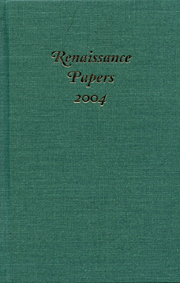Book contents
- Frontmatter
- Contents
- Renaissance Papers
- All Ovids Elegies, the Amores, and the Allusive Close of Marlowe's Hero and Leander
- Revisiting Shakespeare's Eliot
- “'Tis Rigor and Not Law”: Trials of Women as Trials of Patriarchy in The Winter's Tale
- Crossing Wits: Donne, Herbert, and Sacramental Rhetoric
- Love and Power: The Rhetorical Motives of John Donne's 1622 Sermon to the Virginia Company
- Crashaw, Catholicism, and Englishness: Defining Religious Identity
- Addendum
- Beyond “no end”: The Shape of Paradise Lost X
“'Tis Rigor and Not Law”: Trials of Women as Trials of Patriarchy in The Winter's Tale
Published online by Cambridge University Press: 12 September 2012
- Frontmatter
- Contents
- Renaissance Papers
- All Ovids Elegies, the Amores, and the Allusive Close of Marlowe's Hero and Leander
- Revisiting Shakespeare's Eliot
- “'Tis Rigor and Not Law”: Trials of Women as Trials of Patriarchy in The Winter's Tale
- Crossing Wits: Donne, Herbert, and Sacramental Rhetoric
- Love and Power: The Rhetorical Motives of John Donne's 1622 Sermon to the Virginia Company
- Crashaw, Catholicism, and Englishness: Defining Religious Identity
- Addendum
- Beyond “no end”: The Shape of Paradise Lost X
Summary
In addition to the official trial of Hermione (III.ii.1-140), The Winter's Tale features a series of “trials” of women that are less formal but just as consequential. This essay treats five “trials,” loosely defined, of women's speech, sexuality, and agency (I.ii, II.i, II.iii, III.ii.170ff, and IV.iv). In these scenes, men judge women's guilt or innocence of crimes against the fictional social order on the basis of various proofs, signs, and testimonies. The women present their bodies and words as evidence; the men bring social assumptions and legal terms to bear, calling for additional testimony, accusing and sometimes interrogating the women, and ultimately pronouncing judgment on them. The legal terms and procedures Shakespeare includes in the play would have been familiar to his audience, and the connection the play makes between household and state authority, as Constance Jordan has shown, were topics of substantial public debate. Jordan treats the play's exploration of the limits and powers of monarchy; the present essay shows how the play's trials of women explore the limits of royal and familial patriarchy. For convenience the essay considers separately the several trials of each woman—Hermione, Perdita, and Paulina. The “statue” or “resurrection” scene (V.ii.1-110) is another sort of complex trial in which all three women appear; I would challenge older readings that view this scene as transcendent, restorative, or unreservedly positive, but that scene is beyond the scope of this essay.
- Type
- Chapter
- Information
- Renaissance Papers 2004 , pp. 29 - 68Publisher: Boydell & BrewerPrint publication year: 2005



